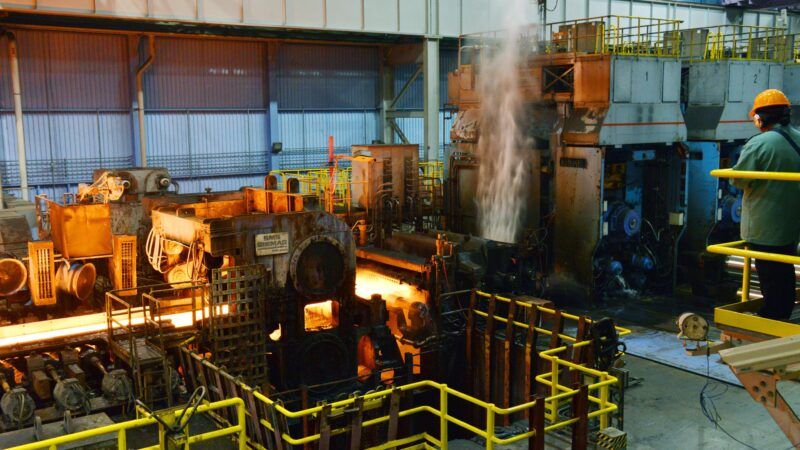Nippon Steel Will Finally Get To Buy U.S. Steel. The Deal Likely Ensures More Federal Meddling in the Future.
The federal government will reportedly get a "golden share" in U.S. Steel, potentially allowing it to overrule shareholders on some decisions.

The Trump administration is finally getting out of the way of Nippon Steel's acquisition of U.S. Steel—but in a way that seems to ensure more federal meddling in the future.
It has been more than 17 months since U.S. Steel, a private company, struck a deal to be bought by Japan-based Nippon Steel for about $15 billion. Before the deal could be finalized, however, then-President Joe Biden swooped in to block the transaction, citing national security concerns that were never well defined. After an extensive review by the Biden administration found no reason to block the deal, Biden unilaterally decided to derail it anyway. During last year's campaign, President Donald Trump and Vice President J.D. Vance sided with Biden (and U.S. Steel's union) and opposed the deal.
But Trump has abruptly changed course. On Friday, he announced "a planned partnership" between the two companies. In a statement posted to Truth Social, the president said the deal would "create at least 70,000 jobs, and add $14 Billion Dollars to the U.S. Economy."
The details of the deal remain cloudy, but it seems like Nippon will invest $14 billion to take over U.S. Steel, with a few caveats. On Sunday, Trump told reporters that the deal is "an investment and it's a partial ownership, but it'll be controlled by the U.S.A," according to the Associated Press.
On Tuesday morning, Sen. Dave McCormick (R–Pa.) told CNBC that the deal ensures an American CEO will continue to run U.S. Steel (presumably as a subsidiary to Nippon Steel) and that the federal government will get a "golden share" in the company. That would "essentially require U.S. government approval of a number of the board members. And that will allow the United States to ensure that production levels aren't cut," McCormick said.
If true—none of this has been disclosed officially yet—then the federal government would effectively hold a majority stake in what remains of U.S. Steel after the Nippon acquisition is completed. In short, Trump would have converted Biden's meddling in the affairs of a private company into an official, permanent place for the federal government on the board of U.S. Steel—which is, I stress once again, a private company.
So-called "golden shares" originated in Britain during the 1980s, when the British government used the arrangement to retain control over companies that were privatized, including several utilities and Rolls-Royce. More recently, they have been used by the Chinese government to exert direct control over supposedly private companies.
It is not surprising to see the U.S. following in China's footsteps in that regard, but it sure is disheartening. While Trump appears to have made the right decision in standing aside and allowing this deal to go through, the inclusion of a "golden share" for the federal government would be a worrying precedent that is likely to chill future investment in American companies.
There was nothing objectionable about the original U.S. Steel/Nippon Steel deal. It was always ridiculous for the federal government, under Trump and Biden, to suggest that Nippon Steel, a publicly traded company based in a close American ally that already operates several steelmaking facilities in the United States, is any sort of a national security threat.
Biden's decision to unilaterally block the deal was a dangerous, disgraceful expansion of executive power that relied on a willingness to stretch the definition of national security beyond any reasonable point. Trump, unsurprisingly, has used that leverage to extend the federal government's control over decisions that should be left to executives and shareholders. All of this will make it easier for Trump (or the next president) to meddle in the future of U.S. Steel, or to apply the same terms to a future foreign investment in any business a future president decides to call a national security threat.
Credit Nippon's negotiators for doing what needed to be done to land a deal that's in the best interests of shareholders and workers on both sides of the Pacific. But don't cheer the bipartisan effort to expand executive power in the marketplace.


Show Comments (22)